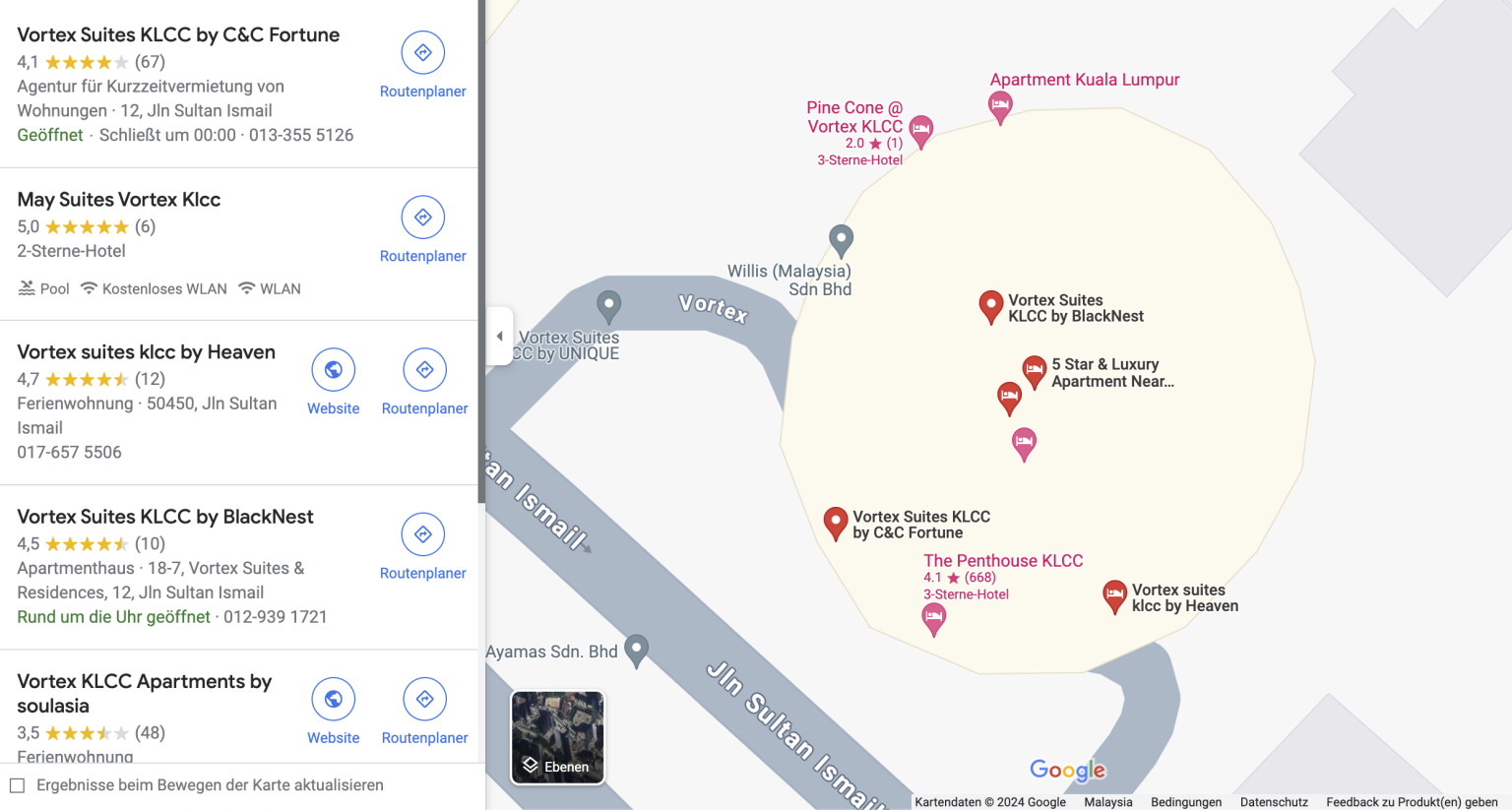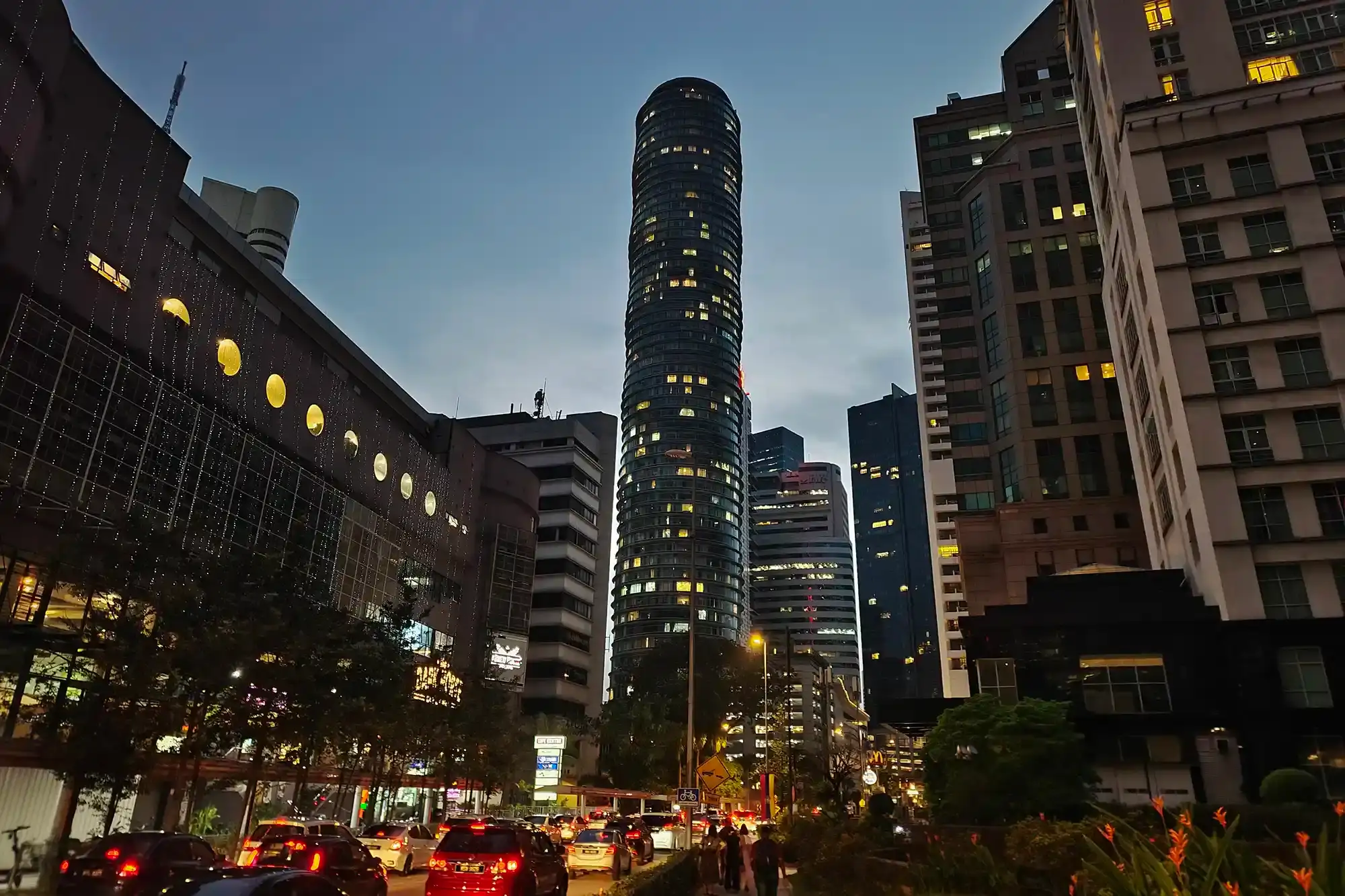In over fourteen years of travel, we can consider ourselves lucky to have never been scammed. At least, not to a level where it hurts. There have been minor rip-offs here and there, of course, like overpriced taxis and meals. Once, we were overcharged for a bottle of house wine in Sicily, where it normally costs about €10. But that’s it. We tend to trust people by default and, although we’re cautious, we don’t spend a lot of time worrying about getting swindled.

But we just had an experience in Kuala Lumpur which reminded us that not everyone is deserving of our trust. It started out as a basic scam — an unscrupulous host refusing to return our rental deposit. But the deeper we dug, the more outrageous the story became. If you’re ready, come along for the ride!

In January, we booked an apartment with a company called “Comfort Suites KLCC By Vortex” in Kuala Lumpur. It was located in a prime spot, with incredible views, and the price was good, too. The reviews posted on Booking.com trended toward the positive. And although there were a few extremely negative comments, we figured that perhaps those guests had been unlucky, or too sensitive. We didn’t like that the property manager required payment in cash on arrival, along with a deposit. Still, that’s not completely uncommon in Southeast Asia.
After a long day of travel, we arrived at the Vortex Tower at around 11pm. Our host came down after about 20 minutes, and began to conduct our business in the entryway of the building. This was weird … was there no office? Wasn’t he taking us up to the apartment? He wanted us to fork over the cash right there, in public? There were over a dozen people standing around us.

By now, the warning bells were ringing! We asked if we could see the apartment before handing over all this money, especially since the deposit would be held for possible damages. On a dime, his demeanor changed from bored/unfriendly to angry/hostile. Raising his voice, he said, “If you don’t want to pay the deposit, you can just cancel your stay!”
And that’s what we should have done. But at that late hour, we couldn’t imagine beginning a hunt for alternative accommodation. Also, according to the cancellation policy stated on Booking.com, we’d lose our money if we cancelled now. In hindsight, he was calling our bluff, daring us to cancel when he knew it wasn’t an option. So despite our trepidations, we handed over the money. He didn’t even provide a receipt, and when we insisted on at least that, he just sent us a Whatsapp message.
Whatever. We ascended to the apartment and went straight to bed. It wasn’t until the harsh light of the next morning, that we realized the apartment wasn’t exactly as promised. Before we rip into it, let’s start with the good: the view was amazing, and the location was excellent.
But that’s it. Looking back at the photos advertised in the profile, we were laughing out loud. The pristine, gorgeous images posted online simply do not reflect the reality of the run-down, ragged, disgusting apartment in which we stayed.

The bathroom ceilings were covered in black mold. The furniture was unsafe, some of it with screws sticking out. One of the chairs was busted and unusable. The bathroom drains were completely clogged, with chunks of hair and unidentifiable goo floating up. This must have caused flooding in the past, to judge by the water damage on the floor. Random nails stuck out of walls. The wallpaper was peeling off in most rooms.

Hold on, I’m just getting started! The bed sheets were yellow. There was disgusting grime in every corner. Nothing was dusted, and the massive windows were so dirty and smeary that we had to clean them ourselves, to avoid being sick. The air-conditioning units were also covered in black mold. The sofa was totally stained, half of the buttons were ripped off, and the cushions were torn as well. At least there weren’t cockroaches! Haha, just kidding, of course there were cockroaches. The place was nauseating, and had nothing to do with the pictures on Booking.com. Should we have known better? Yeah, sure — but that doesn’t change the fact that we had been misled and deceived.

Why didn’t we complain to the host? Well, that would have been an exercise in futility, and we knew it. Another guest had written online, that when they complained about the state of the apartment, the manager’s response was to react furiously. He told them to leave, and that they wouldn’t be getting a refund. There was no point, so we decided to just get through it. After all our years of budget traveling, we’ve developed a high tolerance toward unpleasant living conditions, and we wanted to avoid dealing with the host. Since we had paid cash, we knew there was no chance of a refund.
The day of our checkout finally arrived, and that should have been the end of the story. We probably wouldn’t have even bothered to leave a negative review, just happy to be out of there. But one thing pushed us over the edge. The host didn’t show up for the checkout, and didn’t return our deposit. Alright, buddy: game on.

The night before our checkout, we had confirmed with him that we’d meet at 9am, at the entrance area. He wrote back and agreed. Naturally, he didn’t show up. We called him, sent him messages and after 30 minutes, we called Booking.com, whose agent wasn’t very helpful. After another 30 minutes, we had to leave to catch our train, so we dropped the key cards into the apartment’s mailbox and left.
Later, the host responded, saying he had overslept. This wasn’t true, since we could see that he had been active and available on Whatsapp that same morning. We gave him multiple ways to return our deposit — bank transfer, Paypal, or even a money order to our next destination in Malaysia. He answered with: “I try!” Yeah right. We knew the money was gone, and later we would find similar reviews online where other guests never saw their deposit again.
The Plot Thickens
Dishonesty like this triggers us, so we decided to do some online investigation. And what we found was shocking. There seems to be a network of low-quality apartments companies in Kuala Lumpur. They load their listings with fake reviews and beautiful photos, and even enlist in Booking.com’s “Genius” and “Preferred Plus” programs, to gain trust. Then, once they inevitably rack up enough negative reviews, they close down that listing and open up a new one under a new management company… with the exact same photos. The new one operates until it gets negative reviews, and the cycle repeats.
Proof of Fake Reviews
These pairs of reviews have the same length and always the same strange formatting errors. It’s easy to find more examples of reviews like this with the same types of formatting errors. Sorry for the German reviews 🙂

So, let’s see their game in action! We posted an abysmal review of our experience in “Comfort Suites KLCC By Vortex”, and 48 hours later… surprise! “Comfort Suites KLCC By Vortex” is no longer accepting bookings. Instead, you can book the exact same apartment with a totally brand new company called “The Vortex Suites KLCC By Blissful“.

And this is hardly the first time they’ve done this. If you dig a little, you’ll find reviews on Google Maps showing that these apartments have been through several name changes. The property manager counters their negative reviews with a claim that this isn’t his property! The guest had booked with the other property! They have nothing to do with this booking! Lol, you couldn’t make this up!

If you’ve paid close attention, you’ve noticed that all these properties have the same name structure: “Shifty Apartments KLCC by Shifty Company”. We expanded our search past just Vortex Tower, and discovered similar schemes on Booking.com throughout the city center of Kuala Lumpur. And we verified on Google Maps that these listings have also gone through several name changes.
Just for the fun of it, we searched Booking.com for accommodation in Kuala Lumpur at the end of March. The entire first page of results is spammed with these kind of properties.

This left us speechless. How can Booking.com not be aware of this scam? Are their algorithms so broken, that a company can close one listing, only to immediately open another with the same pictures, in the same building, and it somehow escapes their notice? How can they have not realized that these companies are buying fake reviews? Even we can see that! And that they’re doing this with several properties in the city, over and over again? There is no way that we’re the only people who’ve complained to Booking.com, and there is no way that they can claim ignorance, when these are their top listings for a major metropolis.
Let’s be clear: there is a scam network of apartment managers in Kuala Lumpur actively engaged in ripping off guests, and then covering their tracks by opening new listings when their old listings become littered with negative reviews. Booking.com is either aware of this, or should be, and their inaction is putting the users of their platform into an sketchy situation.
And it’s not just Booking.com — the same scheme exists on other hotel booking platforms, like Agoda and Google Maps (as we’ve seen). Booking.com has refunded our desposit fee, but that’s it — they have not responded to our acknowledged that they are enabling scammers to abuse their platform. We plan on filing complaints with the Malaysian Tourist Police and the Malaysian Tourist Board. And we might look into whether these booking platforms are breaking any laws by neglecting to do even the bare minimum of moderation on their listings. If Booking.com does respond further, we’ll update this post.
Things We’ve Learned
Our trusting natures have taken a hit, and the next time we book accommodation, we will take a more cynical approach. But we’ve learned some new lessons as well:
- Booking platforms want you to book their properties, so they put positive reviews front and center — don’t trust that the reviews you see by default are an accurate reflection of overall opinion.
- Don’t trust listings where the majority of top ratings have no comments or only super short reviews, and come from people staying for just one or two nights.
- Sort reviews by the lowest rating. If there are too many horror stories that share common themes, don’t book it.
- Check out the reviews on Google Maps; they seem to be harsher.
- If you can’t pay for your stay with a credit card (which is common in some countries), demand an actual receipt with a signature, and make sure to see your room first.
- If you have to pay cash, film the transaction with your phone.
- Check if the property has a website. If not, this might be a red flag, because it could indicate that they don’t have an established history or online presence.
After your stay, please don’t hold back from writing an honest review. Take pictures and if the situation calls for it, complain to the booking platform and even the city’s tourist board. From now on, we will be writing reviews after every single stay, calling out the terrible ones, and making sure great hotels and apartments get the praise they deserve.
Have you been affected by a similar scam, or have a horror story about accommodation gone wrong? Please reach out or leave a comment! We’d love to commiserate with you!
